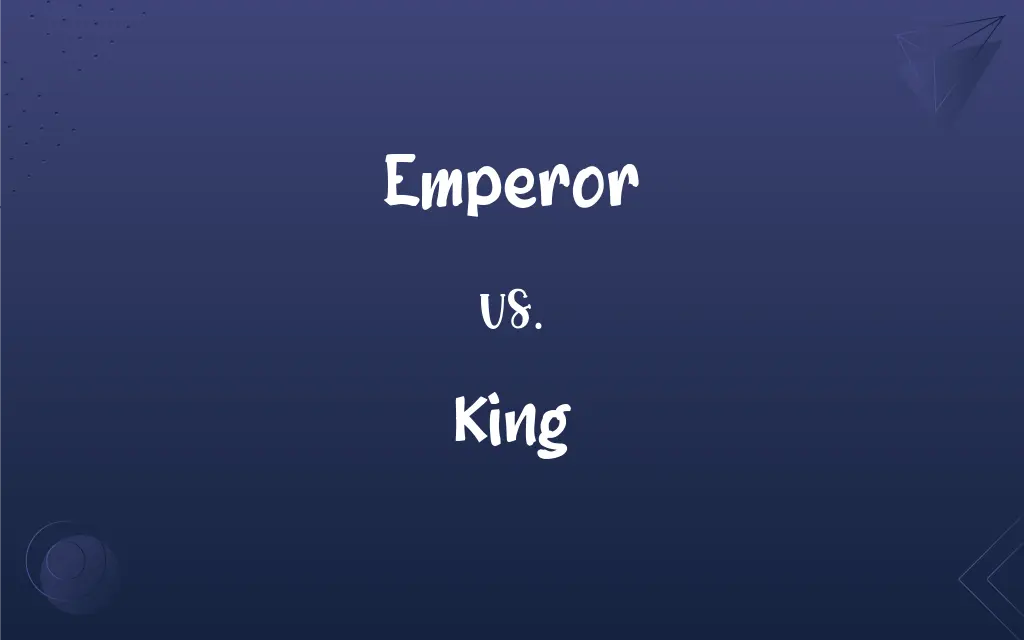Emperor vs. King: What's the Difference?
Edited by Aimie Carlson || By Janet White || Published on October 23, 2023
An Emperor rules over an empire consisting of multiple territories or nations; a King rules over a single kingdom.

Key Differences
The titles of Emperor and King both signify male rulers, but they differ in terms of the breadth and scope of their dominion. An Emperor typically governs an empire, which could comprise multiple kingdoms, regions, or even different nations. For instance, the Roman Emperor ruled over an expansive territory that included many different cultures and regions. Conversely, a King traditionally oversees a more localized territory, known as a kingdom.
Both Emperor and King hold considerable power, but the scale of their rule and influence varies. An Emperor’s domain, given its expansive nature, often requires managing diverse cultures, languages, and administrative challenges. This vastness could sometimes mean that while the Emperor is the supreme ruler, regional kings or governors handle day-to-day governance. On the other hand, a King’s domain, being more localized, might allow for more direct rule over his subjects and territories.
Historically, Emperors have sometimes been seen as having a divine or semi-divine status, owing to the grandeur associated with ruling vast territories. Kings, while still of high importance and often seen as divinely appointed in many cultures, do not usually possess the same overarching divine connotations as Emperors.
Additionally, while all Emperors could technically be called Kings (since they might rule over individual kingdoms within their empire), not all Kings can be called Emperors. The title of Emperor usually indicates a level of power and territory beyond that of a King.
Comparison Chart
Scope of Rule
Over an empire (multiple territories/nations).
Over a kingdom (single territory).
ADVERTISEMENT
Associated Rule
Might have kings under them.
Usually the highest authority.
Historical Connotations
Often seen as semi-divine.
Often seen as divinely appointed.
Title Indication
Higher rank than a King.
Not necessarily lesser, but localized.
Example
Roman Emperor, Emperor of Japan.
King of England, King of France.
Emperor and King Definitions
Emperor
A title higher than a king.
As Emperor, he had several kings under his rule.
ADVERTISEMENT
King
The male ruler of a kingdom.
The King of Spain resides in Madrid.
Emperor
A sovereign ruler with extensive territories.
The Emperor controlled lands across three continents.
King
A title often associated with monarchy.
The King's coronation was a grand affair.
Emperor
Often seen as having a divine status.
The Japanese Emperor was once considered a deity.
King
A male sovereign.
Emperor
The male ruler of an empire.
King
One that is supreme or preeminent in a particular group, category, or sphere
"In many countries, soccer is the king of sports" (Cameron W. Barr).
Emperor
The emperor butterfly.
King
A man chosen as the winner of a contest or the honorary head of an event
A homecoming king.
Emperor
The emperor moth.
King
Abbr. K A playing card bearing the figure of a king, ranking above a queen.
Emperor
The emperor penguin.
King
Abbr. K The principal chess piece, which can move one square in any direction and must be protected against checkmate.
Emperor
The male monarch or ruler of an empire.
King
A piece in checkers that has been moved to the last row on the opponent's side of the board and been crowned, thus becoming free to move both forward and backward.
Emperor
Any monarch ruling an empire, irrespective of gender, with "empress" contrasting to mean the consort of an emperor.
King
Kings(used with a sing. verb) See Table at Bible.
Emperor
(political theory) Specifically, the ruler of the Holy Roman Empire; the world-monarch.
The Investiture Controversy was a conflict between the Emperor and the Pope.
King
A king-size bed.
Emperor
(tarot) The fourth trump or major arcana card of the tarot deck.
King
Principal or chief, as in size or importance.
Emperor
A large, relatively valuable marble in children's games.
King
Of or relating to a king-size bed
King sheets.
A king bed skirt.
Emperor
Any fish of the family Lethrinidae.
King
To make (a piece in checkers) into a king; crown.
Emperor
(entomology) Any of various butterflies of the subfamily Charaxinae.
King
A male monarch; a man who heads a monarchy. If it is an absolute monarchy, then he is the supreme ruler of his nation.
Henry VIII was the king of England from 1509 to 1547.
Emperor
(entomology) Any of various large dragonflies of the cosmopolitan genus Anax.
King
A powerful or majorly influential person.
Howard Stern styled himself as the "king of all media".
Emperor
An emperor penguin.
King
Something that has a preeminent position.
In times of financial panic, cash is king.
Emperor
The sovereign or supreme monarch of an empire; - a title of dignity superior to that of king; as, the emperor of Germany or of Austria; the emperor or Czar of Russia.
King
A component of certain games.
Emperor
The male ruler of an empire
King
(chess) The principal chess piece, that players seek to threaten with unavoidable capture to result in a victory by checkmate. It is often the tallest piece, with a symbolic crown with a cross at the top.
Emperor
Red table grape of California
King
(card games) A playing card with the letter "K" and the image of a king on it, the thirteenth card in a given suit.
Emperor
Large moth of temperate forests of Eurasia having heavily scaled transparent wings
King
A checker (a piece of checkers/draughts) that reached the farthest row forward, thus becoming crowned (either by turning it upside-down, or by stacking another checker on it) and gaining more freedom of movement.
Emperor
Large richly colored butterfly
King
The central pin or skittle in bowling games.
Emperor
A title often passed down hereditarily.
The next Emperor was his eldest son.
King
A king skin.
Oi mate, have you got kings?
King
A male dragonfly; a drake.
King
A king-sized bed.
King
The monarch with the most power and authority in a monarchy, regardless of sex.
King
(graph theory) A vertex in a directed graph which can reach every other vertex via a path with a length of at most 2.
King
To crown king, to make (a person) king.
King
To rule over as king.
King
To perform the duties of a king.
King
To assume or pretend preeminence (over); to lord it over.
King
To promote a piece of draughts/checkers that has traversed the board to the opposite side, that piece subsequently being permitted to move backwards as well as forwards.
King
To dress and perform as a drag king.
King
A Chinese musical instrument, consisting of resonant stones or metal plates, arranged according to their tones in a frame of wood, and struck with a hammer.
King
A chief ruler; a sovereign; one invested with supreme authority over a nation, country, or tribe, usually by hereditary succession; a monarch; a prince.
Kings will be tyrants from policy, when subjects are rebels from principle.
There was a State without king or nobles.
But yonder comes the powerful King of Day,Rejoicing in the east
King
One who, or that which, holds a supreme position or rank; a chief among competitors; as, a railroad king; a money king; the king of the lobby; the king of beasts.
King
A playing card having the picture of a king{1}; as, the king of diamonds.
King
The chief piece in the game of chess.
King
A crowned man in the game of draughts.
King
The title of two historical books in the Old Testament.
King
To supply with a king; to make a king of; to raise to royalty.
Those traitorous captains of Israel who kinged themselves by slaying their masters and reigning in their stead.
King
A male sovereign; ruler of a kingdom
King
A competitor who holds a preeminent position
King
A very wealthy or powerful businessman;
An oil baron
King
Preeminence in a particular category or group or field;
The lion is the king of beasts
King
United States woman tennis player (born in 1943)
King
United States guitar player and singer of the blues (born in 1925)
King
United States charismatic civil rights leader and Baptist minister who campaigned against the segregation of Blacks (1929-1968)
King
A checker that has been moved to the opponent's first row where it is promoted to a piece that is free to move either forward or backward
King
One of the four playing cards in a deck bearing the picture of a king
King
(chess) the weakest but the most important piece
King
A sovereign head of state.
The King met with his council every week.
King
Might be subject to an emperor in certain hierarchies.
The King paid tribute to the Emperor.
King
Often holds the highest authority in his realm.
The King's decree was law.
FAQs
Is a King’s authority limited to one territory?
Typically, a King rules over a single kingdom.
Can an Emperor have Kings under his rule?
Yes, an Emperor might have kings governing regions within the empire.
Which title, Emperor or King, is higher in rank?
Emperor is usually considered a higher rank than King.
How is a King’s power different from an Emperor's?
Kings usually have direct rule over their kingdoms, while Emperors oversee vast territories, often through regional rulers.
Can a woman hold the title of Emperor or King?
Traditionally, women would be titled Empress or Queen, respectively.
Are the titles of Emperor and King hereditary?
Often, but not always, these titles are passed down through familial lines.
Is the power of a King absolute?
Historically, many Kings had absolute power, but in modern times, some are constitutional figureheads.
Are all Kings subject to Emperors?
No, many Kings are the highest authority in their territories.
Was every Emperor seen as divine?
Not every Emperor, but some, like the Japanese Emperor, were considered divine.
Can a King become an Emperor?
If a King conquers or unifies multiple territories, he might adopt the title of Emperor.
What does an Emperor rule over?
An Emperor rules over an empire, often consisting of multiple territories or nations.
Do Emperors and Kings still exist today?
Yes, countries like Japan still have an Emperor, and nations like Spain and the UK have Kings.
Can a kingdom exist within an empire?
Yes, empires often consist of multiple kingdoms.
Is an Emperor's power always greater than a King's?
Generally, Emperors have more extensive territories, but actual power can vary based on historical and regional contexts.
Can there be multiple Kings in an empire?
Yes, an empire might consist of several kingdoms, each with its own King.
Are the duties of an Emperor different from a King?
Duties can vary, but Emperors often have to manage more diverse and expansive territories than Kings.
Are the titles of Emperor and King only symbolic today?
In some countries, these titles are symbolic, while in others, they still hold power.
Do Emperors and Kings have coronations?
Yes, many monarchies and empires have ceremonies to officially crown or recognize the ruler.
Which title is older, Emperor or King?
Both titles are ancient, but the context and origin depend on the culture and civilization in question.
Can the titles of Emperor and King be earned?
Historically, some leaders took or were granted these titles after significant achievements, but often they're hereditary.
About Author
Written by
Janet WhiteJanet White has been an esteemed writer and blogger for Difference Wiki. Holding a Master's degree in Science and Medical Journalism from the prestigious Boston University, she has consistently demonstrated her expertise and passion for her field. When she's not immersed in her work, Janet relishes her time exercising, delving into a good book, and cherishing moments with friends and family.
Edited by
Aimie CarlsonAimie Carlson, holding a master's degree in English literature, is a fervent English language enthusiast. She lends her writing talents to Difference Wiki, a prominent website that specializes in comparisons, offering readers insightful analyses that both captivate and inform.






































































